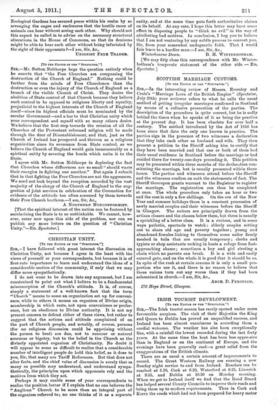SCOTTISH MARRIAGE CUSTOMS.
[To THE EDITOR OF THE "SPECS/TOR...1
SIR,—In the interesting review of Messrs. Eversley and Craie's "Marriage Laws of the British Empire" (Spectator, July 29th) your reviewer refers to what he calls the usual method of getting irregular marriages confirmed in Scotland by means of a collusive prosecution of the parties. The description of the procedure is quite correct, but be is sadly behind the times when be speaks of it as being the practice at the present day. It has been obsolete for over half a century. The method introduced by the Act of 1856 has been since that date the only one known in practice. The parties sign in the presence of two witnesses a declaration that they take each other as husband and wife. They then present a petition to the Sheriff asking him to certify that they have been married and that one or both of them had their usual residence in Scotland before the marriage or had resided there for twenty-one days preceding it. This petition may be presented within three months of the declaration con- stituting the marriage, but is usually presented within three hours. The parties and witnesses attend before the Sheriff and the witnesses confirm on oath the statements of fact. The Sheriff thereupon grants warrant to the Registrar to register the marriage. The registration can then be completed at once. The whole procedure only takes an hour or two and the cost is only a few shillings. On the eve of the New Year and summer holidays there is a constant procession of newly married couples and their witnesses before the Sheriff in Glasgow. The suitors are principally drawn from the artisan classes and the classes below them, but there is usually a sprinkling of a better class. It is a curious, and in some ways pathetic, spectacle to watch : elderly couples setting out to share old age and poverty together ; young and abandoned females linking to themselves some sailor firmly meshed in toils that are usually temporary ; clerks and typists or shop assistants seeking in haste a refuge from fast- approaching shame ; sometimes a boy and girl riveting a chain which no parents can break. It is a wide and easily entered gate, and on the whole it is good that it should be so. In spite of the rush at certain seasons it is only a small pro- portion who use it, and there is no reason to believe that these unions turn out any worse than if they had been solemnized in church.—I am, Sir, &c., 170 Hope Street, Glasgow. ARCH. D. FERGITSON,






































 Previous page
Previous page